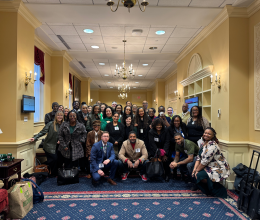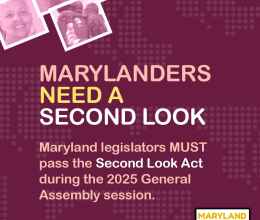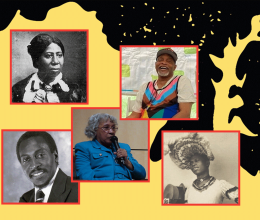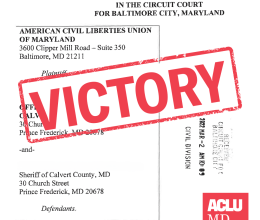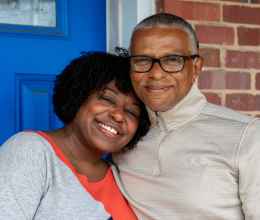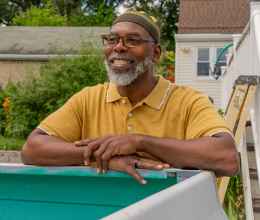Contact: Jane Henderson, Communities United, 240-338-2579
Meredith Curtis, ACLU-MD, 443-310-9946, media@aclu-md.org
Annapolis, Md. - The General Assembly has overwhelmingly approved a bill to restore voting rights to approximately 40,000 Maryland citizens who live in their communities but cannot vote because of a criminal conviction in their past. The bill, which has a broad coalition of support, now heads to Gov. Hogan for his signature.
Current Maryland law prohibits individuals from voting until they have finished probation and parole. SB 340/HB980, introduced by Sen. Joan Carter Conway (D-Baltimore) and Del. Cory McCray (D-Baltimore), simplifies the process by allowing an individual to become eligible to vote upon release from prison or if they are no longer incarcerated.
The bill has been championed the Unlock the Vote coalition, which includes Communities United, Out for Justice, the ACLU of Maryland, the Center for Popular Democracy, Brennan Center for Justice, the Sentencing Project, Maryland Working Families, MD State Conference of the NAACP, the Baltimore City Branch of the NAACP, the Prince George's County Branch of the NAACP, and the National NAACP and the NAACP National Voter Fund. Other supporters of this 2015 legislation include 1199SEIU United Healthcare Workers East, SEIU Local 500, SEIU 32BJ, Prison Ministry Task Force of the Episcopal Diocese of Maryland, the Job Opportunities Task Force, SAVE Our Votes, Colorofchange.org, People for the American Way, the Democracy Initiative, the American Probation and Parole Association, the Legislative Black Caucus of Maryland, and Baltimore City Mayor Stephanie Rawlings-Blake.
"This legislation will have an important and positive impact on our lives," said Perry Hopkins, an ex-offender organizer with Communities United. "It opens the door to participation to thousands of returning citizens struggling with the re-entry process and brings them back into full citizenship. We hope and pray that Governor Hogan will see the wisdom in signing it."
"SB340/HB980 will strengthen our communities. The majority of citizens regaining their voting rights under this legislation are African American and we know that returning citizens who vote are less likely to offend again. It is a win for civil rights and public safety," said Gerald Stansbury, President of the Maryland State Conference of the NAACP. "We applaud the General Assembly for its passage of the bill and urge the governor to sign it."
"Americans believe in second chances. Restoring a person's right to vote once they've paid their debt to society gives them an opportunity for redemption and a chance to be full members of their community," said Tomas Lopez, Counsel at the Brennan Center for Justice at NYU School of Law. "This bill will help thousands of people who live, work, and raise families in Maryland. Our democracy will only grow stronger when more citizens participate. We applaud the General Assembly for passing SB 340, and call on Governor Hogan to sign it."
"More than 50 years since the historic march in Selma, Alabama and enactment of the Voting Rights Act, nearly 2.2 million African Americans nationwide still cannot vote because of a criminal conviction. In Maryland, they constitute two-thirds of those denied the vote - the most fundamental right of any democratic society," said Katrina Gamble, Director of Civic Engagement & Politics at the Center for Popular Democracy. "With his signature, Governor Hogan can unlock the vote for thousands of probationers and parolees and help heal the wounds that have divided our nation for far too long."
"Maryland's current policy has a clearly disproportionate impact on the voting rights of African Americans," said Toni Holiness of the ACLU of Maryland. "We hope the Governor will sign this important legislation - this is an effort to safeguard the political voice of marginalized communities."
The measure builds on recent bipartisan support for rights restoration around the country. Last year, U.S. Attorney General Eric Holder called on states to restore voting rights. Supporters from across the political spectrum have introduced bills in Congress to restore rights, including the Civil Rights Voting Restoration Act of 2015 from U.S. Sen. Rand Paul (R-Ky.) and the Democracy Restoration Act of 2014 from U.S. Sen. Ben Cardin (D-Md.) and U.S. Rep. John Conyers (D-Mich.).
Over the past two decades, more than 20 states have improved their criminal disenfranchisement laws, including Maryland, which ended lifetime disenfranchisement in 2007. Like similar laws elsewhere in the United States, Maryland's criminal disenfranchisement law disproportionately impacts racial minorities. It is estimated that African Americans comprise more than half of Maryland's disenfranchised population. The bill now before Governor Hogan gives Maryland an historic opportunity to join the national movement to restore voting rights to people who are released from prison, joining 13 states and the District of Columbia.
###
